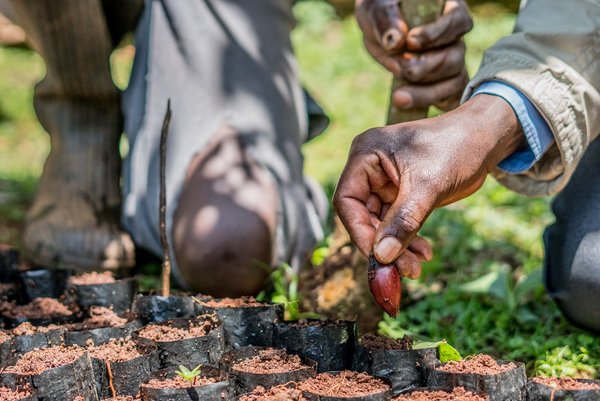 Read this article in French
Read this article in French- Share this article
- Subscribe to our newsletter
Harnessing the power of African native trees
An ambitious six-year climate initiative harnessing the power of native tree seeds led by the Center for International Forestry Research and World Agroforestry (CIFOR-ICRAF) was launched in Nairobi, Kenya, in March 2024. It aims to advance African land restoration goals. The Right Tree, Right Place: Seed Project will enhance the availability of high-quality native tree seeds across Kenya, Uganda, Ethiopia, Rwanda and Burkina Faso.
“Africa faces alarming degradation of its landscapes. Over 50 per cent of the continent’s land area is classified as degraded, costing billions in lost productivity annually and threatening livelihoods. Compounding this crisis is the rapid loss of biodiversity, including gene pools of African forests, as the State of the World's Trees 2022 report, published by Botanic Gardens Conservation International (BGCI), states, with extinction due to deforestation and climate change. Africa is especially vulnerable from this loss of nature’s resilience,” said Ramni Jamnadass, Senior Advisor of Biodiversity and Trees Genetic Resources at CIFOR-ICRAF and Principal Scientist of the project.
The initiative seeks to bridge the gap between planting policy and execution, improve coordination between the public and private sectors in seed accessibility, and establish viable business models to promote the adoption of native tree seeds, all of which allow a unique combination of skills.
Investing in seed systems
“We need high-quality seeds for the right species that are best suited to their purpose and environment. This is how we create good and resilient ecosystems – for food security, biodiversity, livelihoods and stabilising our climate. By nurturing native species, we are not only safeguarding our environment but also partnering with local communities and fostering resilience. Investing in seed systems is to preserve our heritage, protect biodiversity, build a global commons that can ignite high-quality tree seed systems, including the private sector, and secure a sustainable future for generations to come,” said Éliane Ubalijoro, Chief Executive Officer of CIFOR-ICRAF.
With a budget of 20 million euros, this landscape restoration endeavour will foster an environment conducive to native tree seed and seedling production and enhance supply-demand dynamics, through knowledge sharing, seed mobilisation and capacity development, for example. The project’s innovative force lies in addressing local and global challenges through tree planting for both current and predicted future climates. It builds upon local knowledge, science and cooperation between communities and the public and private sectors to make restoration scalable and sustainable.
Covering 20 million hectares of land
The Right Tree, Right Place: Seed Project is funded by the German Federal Ministry for the Environment, Nature Conservation and Nuclear Safety (BMUV) through the International Climate Initiative (IKI) and is implemented by CIFOR-ICRAF, Unique land use GmbH, BGCI, the Global Landscapes Forum (GLF) and the University of Copenhagen (UCPH)/Denmark.
Key indicator targets of the initiative are to cover 20 million hectares of land by 2045, conserve an extra 4 million tonnes of soil per year, achieve an extra 19 million tonnes of sequestered CO2 and increase in employment of over 80,000 jobs in harvesting additional tree products.
The Right Tree, Right Place: Seed Project will be implemented in:
- Kenya, whose commitment under the Bonn Challenge and AFR100 initiatives is to restore 5.1 million hectares of native forest by 2030;
- Ethiopia, where the project is aligned with the Government’s commitment to build a Climate Resilient Green Economy by 2030 as well as to achieve the country’s pledge to restore 15 million hectares of native forest by 2030 under the Bonn Challenge and AFR100 initiatives;
- Rwanda, where the project supports the country’s Bonn Challenge to restore 2 million hectares of land and their Vision 2050 to transition to a green economy;
- Burkina Faso, where it contributes to participation in the African Union Great Green Wall initiative as well as pursuing its pledge to restore 5 million hectares of land under AFR100 and the Bonn Challenge;
- Uganda, where it supports the aim to restore around 12 per cent of its total land area (2.5 million hectares) under the AFR100 and the Bonn Challenge initiatives.
(ICRAF-CIFOR/ile)





Add a comment
Comments :